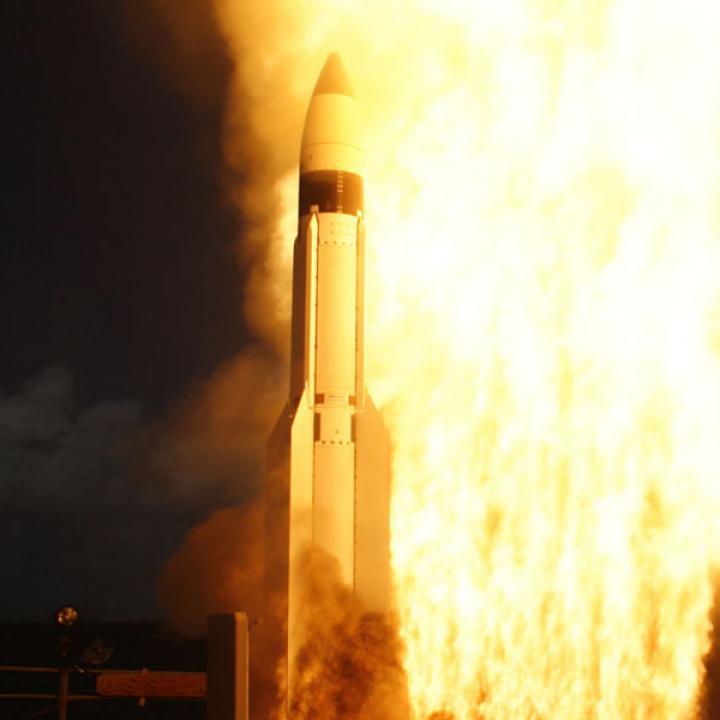

The introduction of Scud missiles highlights the regime's desperation and should prod Washington to begin overt political and military outreach to the armed opposition.
The Assad regime's use of Scud missiles over the past several days represents a dramatic escalation in its war against the rebels, with deep military, psychological, and political implications for the Syrian people. More urgently for Washington, the Scud strikes have come just as the United States is finally recognizing the National Coalition of Syrian Revolutionary and Opposition Forces (SOC) -- the latest indication that events on the ground are rapidly outpacing U.S. policy, and that Washington should revisit its redlines.
EFFECTS OF SCUD ATTACKS
Scud missiles can deliver a 1,000-pound high-explosive warhead or a chemical agent. Although they are not very accurate, there is no effective way for the regime's opponents to stop them. Assad's longer-range Scuds, the C and D types, can reach most if not all of Syria from the Damascus area, where the major Scud garrisons are located.
Scuds also create surprise and shock. The rebels have no means of knowing when the missiles have been fired, where they are going, or what kinds of warheads are onboard. In fact, even with good intelligence collection, there is no reliable way to know which Scuds have been uploaded with chemical warheads. The regime's decision to deploy the missiles therefore crosses another threshold, reducing potential warning time for more Scud launches and posing a greater threat to Syria's neighbors, particularly Turkey and Israel.
At the same time, Scuds are not particularly effective against the types of targets the rebels represent -- dispersed light-infantry forces. They could have more of an impact if the regime is able to identify concentrations of rebel personnel or key facilities such as headquarters. And chemical warheads would have more effects, of course.
To be sure, continued Scud attacks would have psychological effects on rebel combatants and civilians, including fear, a sense of defenselessness, and trauma. But history shows that populations under missile attack can adapt quickly. In addition, rebels and civilians are used to being bombed. In all likelihood, the combatants will adapt relatively quickly, while the civilians will take more time.
Currently, only limited assets are available in the region to defend against Scud attacks. U.S. naval assets in the Eastern Mediterranean have some capability, as do Israeli antimissile systems. Turkey will gain some capability to defend itself when the Patriot missiles that have been approved for deployment arrive.
POLITICAL IMPLICATIONS
The use of Scuds reflects the regime's increasingly dire straits -- using a strategic asset like long-range missiles against a widely distributed insurgency, with no critical military targets to strike, represents desperation rather than sound military strategy. Given that the regime now seems to be using whatever weapons it has regardless of their effectiveness, the question becomes whether the Scud launches are a prelude to chemical strikes. The regime may also be using Scuds to restore its initiative now that the rebels have portable air-defense weapons, as the Soviets did under similarly desperate conditions in Afghanistan in the 1980s.
The Scud launches seem designed to not only terrorize the opposition into submission, but also show Syria's neighbors that Assad is capable of edging dangerously close to the international community's redlines even as his control over the country slips. By demonstrating that it is willing to escalate, the regime could entice these neighbors -- along with the United States -- into accepting a diplomatic solution brokered by Russia, whether to force the rebels to stop fighting or, more likely, cut a deal diplomatic deal to save the regime.
U.S. RESPONSE
Again, the regime's use of Scuds shows the degree to which U.S. policy is out of touch with events on the ground, with implications for all of Syria's neighbors and beyond. Washington should revisit its redline on Assad's chemical weapons (which was rolled back recently from the original "use and movement" to just "use") to include conventional strategic weapons such as Scuds, perhaps in tandem with taking the issue to the UN Security Council. In addition, the U.S. 6th Fleet has forces in the Mediterranean to help deal with the Scud threat, including one to two Aegis ships equipped with SM-3 missiles.
Given the introduction of Scuds into the fray and the reportedly growing threat of chemical attacks, the Syrian opposition feels under dire threat from the Assad regime and has drawn little encouragement from Washington's recent policy moves. For example, this week's U.S. designation of Syrian jihadist group Jabhat al-Nusra as a terrorist organization came before yesterday's formal recognition of the SOC -- a coalition that Washington actually helped form over a month ago. The Syrian opposition sees this apparent disconnect as evidence that Washington is out of touch with the rapidly deteriorating humanitarian situation and more concerned with counterterrorism than getting rid of Assad. Given that the rebels seem poised to take over large parts of the country soon -- a notion that the regime itself appears to buy into if the Scud firing is any indication -- overt political and military outreach to the armed opposition is in order if Washington hopes to fulfill its objectives of a secular and democratic post-Assad Syria.
Andrew J. Tabler is a senior fellow in The Washington Institute's Program on Arab Politics. Jeffrey White is a defense fellow at the Institute and a former senior defense intelligence officer.




